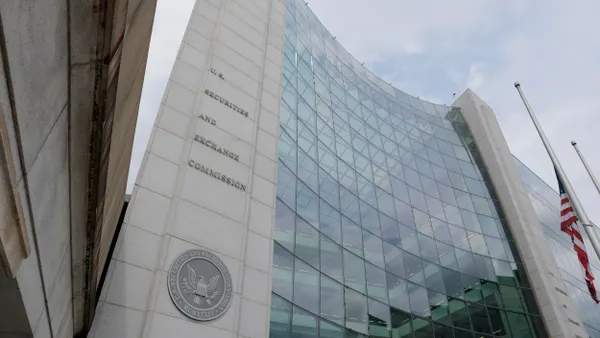Dive Brief:
- Under current law the increase in federal debt during the coming decade will push up borrowing costs, erode private investment by 13.6% and reduce the size of the economy by $340 billion, the Peter G. Peterson Foundation said Monday.
- U.S. debt by 2035 will balloon from 100% of gross domestic product to 117% in 2035 and 156% by 2055, the foundation said, citing analysis by EY and the Congressional Budget Office. The U.S. in the coming decade will also lose 1.2 million jobs and wages will shrink 0.6%, according to Peterson projections.
- The forecasts do not account for current efforts by President Donald Trump and Republican lawmakers to boost federal spending and avert the expiration of 2017 tax cuts. If signed into law, such changes “would significantly increase deficits and debt above these current law projections,” the foundation said.
Dive Insight:
Borrowing costs initially surged before receding on Monday, the first day of bond trading after Moody’s Ratings late Friday cited the gloomy fiscal outlook and downgraded U.S. debt to Aa1 from Aaa.
The yield on the 10-year Treasury — a benchmark for business and consumer lending – increased from 4.48% at the start of trading to as high as 4.56% before falling to 4.46%.
The rating downgrade “reflects the increase over more than a decade in government debt and interest payment ratios to levels that are significantly higher than similarly rated sovereigns,” Moody’s said in a statement.
“We do not believe that material multi-year reductions in mandatory spending and deficits will result from current fiscal proposals under consideration,” Moody’s said.
If Trump and the Republican-controlled Congress extend the 2017 Tax Cut and Jobs Act, they will add roughly $4 trillion to the primary fiscal deficit — which excludes interest payments — by 2035, Moody’s said.
“Without adjustments to taxation and spending, we expect budget flexibility to remain limited, with mandatory spending, including interest expense, projected to rise to around 78% of total spending by 2035 from about 73%” last year, Moody’s said.
In coming years, federal revenue will probably fail to keep pace with the cost of servicing U.S. debt and federal spending, especially on outlays to entitlements such as Social Security and Medicare, according to the foundation.
“As these federal obligations grow without reform, policymakers will face more and more difficult decisions on how to address the structural imbalance between spending and revenue,” the foundation said.
Each percentage point increase in the debt-to-GDP ratio will increase interest rates by 0.02 percentage point, according to the foundation.
“The timing of the downgrade isn't a coincidence,” analysts at Bank of American Securities said Monday in a report.
“With tax cuts and tariffs hanging in the balance, Moody's appears to be sending a message that it thinks these policy changes will, on net, put the U.S. on an even worse fiscal trajectory,” the analysts said.
“The question now is whether this downgrade will motivate congressional Republicans to pivot to a more fiscally responsible package, with smaller or less front-loaded tax cuts, and/or more spending cuts,” they said.
“That would be worse for growth in the near term, but better for the U.S.'s long-term fiscal health,” the analysts said.
Ballooning federal debt will weigh on consumers, with annual per capita income shrinking by $1,000 in 10 years, $3,240 in 30 years and $5,210 in 50 years, according to the foundation.
The harm will “unfold gradually as the accumulation of debt over time puts upward pressure on long-term interest rates,” the foundation said.
“Sustained increases in the amount of federal borrowing are projected to lead investors to demand higher yields, due to increased risk and supply/demand effects,” the foundation said.
The mounting federal demand for capital will “crowd out” private investment, undermining economic growth and job creation, according to the foundation.
“For those looking for a signpost to tell us when to stop adding to our national debt, they should look no further than Moody‘s downgrade, Peterson Foundation CEO Michael Peterson said Friday in a statement.
“It’s unacceptable for a great country like America to harm its own credit rating,” he said. “We have plenty of options on the table to fix this, and it can be done quickly, with leadership.”















